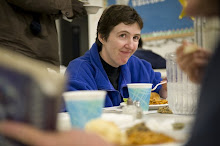John Roberts, Priest
Deuteronomy 31:30–32:4, 6b-12a
John 7:37-41a
Today we honor the memory of John Roberts.
Who was he? What is his story?
John Roberts was an adventurous soul.
He was born on a farm in Wales in 1853.
He was educated at a college that was affiliated with Oxford,
and left Wales for the Bahamas in 1878.
He was ordained to the priesthood there.
Roberts was chaplain of St. Matthew’s Cathedral in Nassau,
and he also worked in leper colonies.
After two years in the Bahamas, Roberts sailed to the US.
He asked the bishop of Wyoming and Colorado for
missionary work in his most difficult field.
Bishop James Spalding gave it to him,
at the Wind River Indian Reservation
in the mountains of Wyoming.
In February, 1883,
Roberts literally hitched a ride
from Colorado to Wyoming
on a jury-rigged mail wagon,
in a blizzard.
He served two tribes on the reservation:
the Eastern Shoshone people and the Arapaho.
He set about learning all he could about both tribes’ customs and beliefs,
believing that he could be more effective
if he knew and respected the people he wanted to minister to.
He also learned the Arapaho and Shoshone languages.
He eventually translated the gospel.
Roberts often said that his goal
was to help the Native Americans to be self supporting.
With this in mind,
he established two schools for Native children.
He earned the trust of the tribal leadership
and was often involved in their negotiations
with federal agents.
He dealt fairly with the people.
In turn, they called this white, European priest, “Elder Brother.”
A friend remarked this morning,
how odd it seemed to commemorate a man
for treating people fairly.
She was right.
But I’m struck by someone crossing the ocean
to purposely, consciously, and repeatedly
share God’s love and justice
with a forgotten and shoved-aside people.
Roberts lived into his call
as a priest of the high mountains,
the forgotten people,
the dry and desolate places.
We entered Lent with the image of Jesus in the wilderness.
He went there to fast, pray,
and be as transparent as he could to the will of God
speaking louder and louder,
to him and through him.
John Roberts went to the wilderness to seek and serve Christ in all people.
The compelling image running through both the Old Testament reading
and the Gospel for tonight
is the picture of water in the desert.
Moses prays,
“May my teaching drop like the rain,
my speech condense like the dew;
like gentle rain on grass,
like showers on new growth.
For I will proclaim the name of the Lord;
ascribe greatness to our God!”
He’s saying, My people, you are so thirsty.
Let my words transform and heal you.
God is your water. God is your rock.
There are no others.
There is no one else who can sustain you.
Jesus calls to the people,
“Let anyone who is thirsty come to me, and let the one who believes in me drink. As the scripture has said, ‘Out of the believer’s heart shall flow rivers of living water.’”
God is your water.
The water of life flows within you,
and out from you,
and all around you.
Hear my words, and let them heal you.
Drink deeply.
Soothe your thirst.
Let the river flow from you,
for other thirsty people.
What is wilderness?
I think of the canoe camping trips in the Cascade Mountains
that I took as a kid in Girl Scouts.
Cold glacial rivers, high volcanic peaks.
Tying our food up in a tree, away from bears.
No people,
other than our own pack of sunburned teen-agers,
and the college students who supposedly
were responsible for us.
You might think of Yosemite,
or wherever else you go when you want to get away.
We go to the wilderness because it is beautiful.
We go, to get out of the city.
We go because it’s fun.
Jesus went to the wilderness to uncover himself.
John Roberts went there to serve disenfranchised people,
in Christ’s name.
Jesus became water in the desert.
John Roberts brought that water,
as respect, love, and justice for God’s children
that humankind wanted to forget.
The wilderness that Roberts crossed an ocean to find,
is never really out of our vision.
We may not literally go to a reservation.
We don’t have to.
But neither do you have to find it
among the homeless people in Friendship Park,
or in our own Great Hall on a night
when we are hosting Safe Ground.
(Though if you feel called to this ministry,
please come.)
The wilderness is everywhere that people are
forgotten, hurting, lonely, or afraid.
We all react more strongly than we should,
to a perceived attack that wasn’t.
We all sometimes want things to be different than they are.
There are wild places in each of us,
living next to the places that are healed and whole and strong.
When you go to the wilderness,
bring with you love and compassion.
Take with you the truth
that every human being is beloved of God.
Carry with you the water of life.




